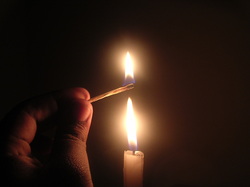
In fact, men and women alike have been taught who they are supposed to be in these preset "norms." When we don't meet these "norms" as set by our families, society, and our generations, shame creeps in and we can become lonely, exhausted, and self critical and unhappy. We loose ourselves behaving how we believe we "should" behave and live.
Those who have learned "shame resilience" and are able to do a "reality check" choose consciously not to play into these preset "norms".
The man in shame says, "I am not supposed to get emotional when I have to lay off people."
The man practicing shame resilience pauses and responds, "I am not buying into this message. I've worked with these guys for five years. I know their families. I am allowed to care about them."
Shame also whispers in the ear of the woman who is out of town on business. "You are not a good mother because you are going to miss your son's play."
After a pause and a "reality check" she replies, "I hear you, but I am not playing that tape today. My mothering is way bigger than one class performance. You can leave now."
One of the most powerful ways that our shame trigger get reinforced is when we enter into a social contract based on these gender straitjackets. Our relationships are defined by women and men saying, "I will play my role and you play yours."
One of the patterns revealed in research is how all that role playing becomes almost unbearable around midlife. Men feel increasingly disconnected, and the fear of failure becomes paralyzing. Women are exhausted, and for the first time they begin to clearly see that the expectations are impossible. The accomplishments, accolades, and acquisitions that are a seductive part of living by this contract and people start to feel like this life is a false bargain.
Remembering that shame is the fear of disconnection--the fear that we are unlovable and don't belong--makes it easy to see why so many people in midlife over focus on their children's lives, work sixty hours a week, or turn to affairs, addiction, and disengagement. We start to unravel. The messages and expectations that fuel shame keep us from fully realizing who we are as people. We fit into these "norms" and we become lost about who we are, unhappy because we are lost.
The greatest lesson is this: If we are going to find our way out of shame and back to each other, vulnerability is the path and courage is the light. To set down those lists of what "we're supposed to be", is brave. To love ourselves and support each other in the process of becoming real is perhaps the greatest single act of courage. "To thine own self be true" and Look into and honor who you are as a human being.
 RSS Feed
RSS Feed
